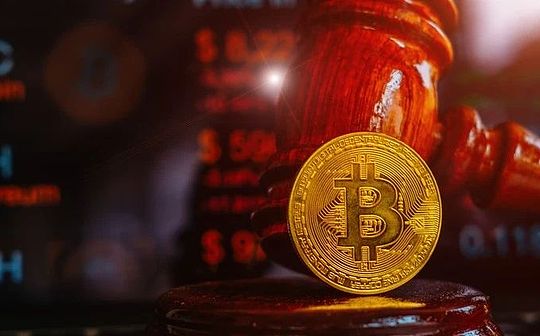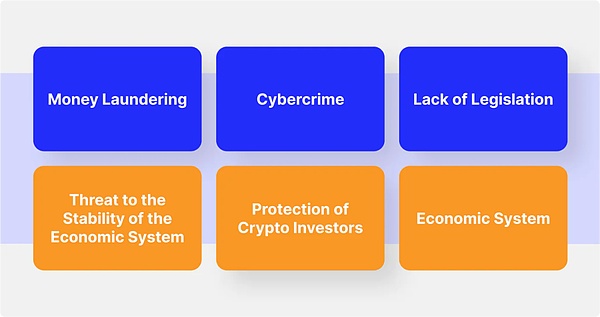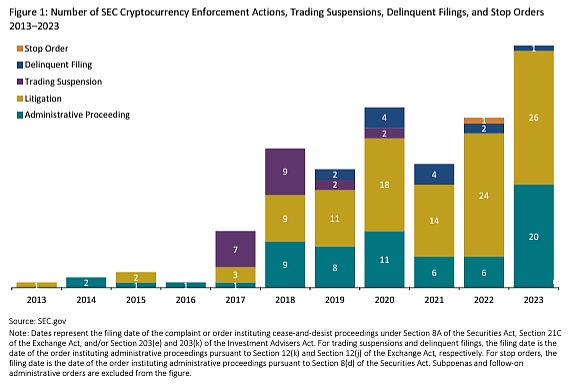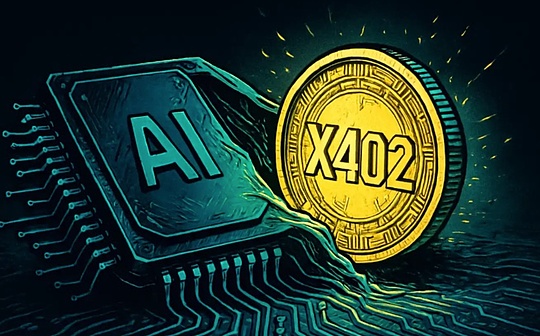
Author: Huohuo, vernacular blockchain
Recent supervision and reporting news continued. Just on June 28, the US Securities and Exchange Commission (SEC) filed a lawsuit against Consensys, accusing him from being registered as a broker through the Metamask Sauding service, and this was the end of the SEC notification of Consensys.The Ethereum 2.0 survey has only been in the past two weeks.
According to relevant information,For the first time, the SEC’s severe crackdown on encryption began in 2017.At that time, a network department was established to deal with a decentralized autonomous organization called The DAO.Later, the department was renamed as encrypted assets and network departments.The SEC has increased the supervision of the cryptocurrency market, and launched a series of law enforcement operations on issues such as unregistered securities issuance, fraud and market manipulation.
In 2023, SEC has stronger enforcement, and has taken 46 actions of 46 actions, an increase of 53%over 2022.In particular, the US $ 4.3 billion fines on the head trading platform BN, and made its CEO Zhao Changpeng CZ step down, was a sensation inside and outside the circle.
Counting it, by 2024, the seventh year of SEC’s campaign to combat encryption, and the two sides are still in the game.So,What are the recent AEC actions?What is the impact of the development of encryption?
01SEC’s recent entanglement with encryption
The SEC (US Securities and Exchange Commission) is an institution of the US government’s regulatory stock market.To this end, the SEC has formulated securities registration rules and supervised its performance.
 Source network
Source network
For the crypto industry, in fact, as early as 2013, the cryptocoltic development has begun to supervise.It is just that many small movements do not pay attention to the public,今年6月份,圈内媒体写过一篇《SEC 的加密执法行动:一览SEC 发起的20 项主要指控》,罗列了自SEC开始监管加密以来进行的20项重大监管项目,包括FTX的崩盘事件、BN’s fines.
 Picture source: SEC official website
Picture source: SEC official website
In 2024, in addition to the CONSENSYS mentioned at the beginning of the article, the SEC also carried out a number of activities and updates on the encryption and DEFI field.Let’s take a look at:
1) Approval through Bitcoin ETF
January 11, 2024,,SEC approves Bitcoin ETFThis is an important regulatory milestone.This critical decision is to pave the way for mainstream investors to participate in the Bitcoin market known for its high volatility and innovation.
The encrypted community expressed rejoices about this, because this is a great progress that the cryptocurrency is legalized into an investment option that ordinary public can obtain.
2) SEC redefine “traders”
On February 6, 2024, the SEC passed the new encryption supervision rules.These rules require wider market participants to register, join self -discipline agencies, and abide by existing securities laws and regulations in SEC.
This document detailed terms such as “dealers” and “government securities dealers”, and clarified what constitutes the participation of “part of the normal business”, thereby expanding the supervision and supervision of cryptocurrencies and DEFI.
However, these regulations require physical enterprises to manage or control assets worth at least $ 50 million.
The reaction of the encryption community is relatively negative:
The DEFI Education Fund criticized the new rules of the SEC to be misleading, emphasizing that DEFI participants lacked a feasible compliance way, and said that this method was unrealistic and stifled innovation.
Marisa Coppel, the legal director of the Blockchain Association, believes that the modified “dealer” defines an unrealistic standard for the DEFI project and lacks clearness.
3) Prosecution UNISWAP
On April 10th, Uniswap Labs posted a news on Twitter, saying: “We have received Wells Notice from Sec”.
What does “Wells Notice” mean?Simply put:
Wells Notice = SEC’s declaration of war, which means: “We want to sue you, see it in court.”

The SEC mainly complains the following three things to Uniswap:
A.UNISWAP LABS services through the wallet app to the transaction broker (Broker);
B.UNI token is “unregistered securities”;
C.Uniswap Labs operates a trading platform for selling “unregistered securities”.
Then in May, Uniswap submitted a 40 -page file to the SEC, and the allegations were accused of detailed counterattack, and the subsequent was to be updated.
4) Prosecutor Robinhood
Robinhood is a financial service company in the United States. On May 4th, the company also received Wells Notice from SEC.
Later, Dan Gallagher, the head of Robinhood law, compliance, and corporate, said in a statement,ShouldThe company has been communicating and cooperating directly with the SEC for many years, including the well -known attempts of ‘come in and register’, but disappointed with SEC to send them Wells Notice.
However, it is not clear from the previous letter which token is the securities, but it is worth noting that Robinhood has taken the initiative to remove some token from the list -including Solana (SOL), Polygon (MATIC) and Cardano (ADA) – To deal with the previous SEC’s lawsuit against competitors trading companies.
5) Approval of Ethereum ETH
On April 26, 2024, Ethereum blockchain software developer Consensys Software Inc. prosecuted SEC on the Ethereum regulatory issue in the Federal Court of Texas.The approval of Ethereum ETF undoubtedly indicates that the SEC will officially abandon ETH as a securities position.
On May 23, 2024, SEC approved the sales of the Ethereum Ethereum ETF. This is the second time the SEC has made a milestone decision after Bitcoin ETF, which also surprised the encrypted community.
Ethereum blockchain’s native Token ETH is the second largest cryptocurrency after Bitcoin’s market value. After being approved by Bitcoin ETF, a large number of applications for ETH ETFs have also come to SEC.
In this incident, SEC approved multiple ETH ETF applications under the 19B-4 form.
It was only the day after the Bitcoin ETF was approved, the transaction began. The approval of Ethereum was not approved by all documents.Therefore, before the Ethereum ETF starts the transaction, the fund also needs to obtain the S-1 file disclosure approval, which will include detailed information of the fund, such as costs and product operation methods.The SEC does not specify the specific period of the S-1 file, so it may take time to transaction from Ethereum ETF.
However, Ethereum ETF is about to be approved, and the community can be the next ETF candidate for which cryptocurrency.
6) FIT 21 Act
As the election years approach, cryptocurrencies have become important votes.Trump accepts cryptocurrency donations and criticizes the Cynton government’s cryptocurrency policy. The future encryption response of the Biden government may also be soft.
No, on May 24, the House of Representatives of the United States officially adopted the “21st Century Financial Innovation and Science and Technology Act” (referred to as FIT 21).The bill was led by the Republican Party and was supported by many Democratic members and was finally approved.
The main task of the FIT 21 proposal is to define the jurisdiction of the U.S. Stock Exchange Commission (SEC), and which aspects are the jurisdiction of the Commodity Futures Trading Commission (CFTC).In the past, the dual supervision of SEC and CFTC for cryptocurrencies has been the pain point of the United States. The supervision of the two departments is very strict, and the regulatory power has obvious competition.
The approval marks an important milestone in the cryptocurrency industry. Although it takes time to officially implement it, it provides investors with new opportunities and indicates that the regulatory environment may be further improved in the next few months.
7) Prosecution coinbase
On June 6, SEC sued Coinbase and accused him of illegally operating crypto asset securities business without registered.
In a complaint submitted to the Federal Court of Manhattan, SEC wrote that starting from 2019, Coinbase earned billions of dollars by operating as an intermediate person in an encrypted asset transaction.Essence
SEC said that Coinbase trades at least 13 cryptocurrency assets. These assets are registered securities, including tokens such as Solana, Cardano and Polygon.
 Picture source: SEC official website
Picture source: SEC official website
This was another major trading platform after the head trading platform BN was sued last year.
8) Prosecution of encrypted banks
On July 1st, according to Reuters, SEC sued the Capital Capital in a federal court to accuse its securities fraud.
SEC said that after the FTX collapse in 2022, Silvergate misleads investors on its bank confidentiality system, anti -Money Laundering (AML) compliance plan, and bad financial conditions.At the same time, the bank failed to monitor the suspicious transfer of FTX and its associated entities nearly 9 billion US dollars.
On July 2nd, Silvergate had agreed to pay $ 63 million to reconcile the US and California regulatory agencies’ allegations of internal management errors and disclosed bad information to investors.
02Why does SEC bite the encryption industry without letting go?
There are different degrees of encryption supervision in various countries around the world.Due to the special status of the United States, the improvement of market size and related laws and regulations,SEC has to choose to closely supervise cryptocurrencies through legal terms. The surface starting point is:: investor protection, market stability maintenance, AML and other laws, but from the launch of Bitcoin and Ethereum spot ETFs and the pastYou can see other clues for legal action goals:
1) The game behind the US election
Due to the huge number of encrypted enthusiasts in the United States, it is no longer a small group. Previously, Trump’s presence to the crypto industry has attracted the eased attitude under the control of Biden and its party.You can go through the process.See the previous article for details:>Trump competed with Biden to “draw Bitcoin”. Has the U.S. encryption supervision be turned around?
2) The consideration of the US dollar status
Although encryption and Web3 innovation are there, financial innovation is also accompanied by certain risks.The rise of Bitcoin has challenged the status of the US dollar hegemony to a certain extent, and the encrypted assets led by Bitcoin have vaguely become a tool that bypass the U.S. dollar encryption hegemony.It is impossible to complete.Therefore, “blocking is not as good as sparse”, guiding and even controlling this powerful tool, forming a situation of favorable position in the future of the US dollar is the only feasible way.
At present, the heavy task of SEC shoulder is to suppress and prevent the loss of control of encrypted financial companies in time. The crypto platforms with excessive market power and some mainstream projects have regulated their behavior in their legal actions., Digital US dollar market is favorable for development.
Generally speaking, every encryption supervision of the SEC is very eye -catching, behind it is the balance of innovation and risk and the consideration of maintaining the US dollar strategy.
03Will SEC supervision be good or bad for the encryption industry?
SEC’s supervision has played a key role in ensuring market fairness, transparency and stability, and promoted financial innovation and investor protection to a certain extent.But at the same time, regulatory measures have also brought some compliance costs, which curb the development of the market to a certain extent.
1) Active impact
To be fair, SEC does not want to be a villain. The original vision was to protect American investors involving risk assets. By curbing price manipulation and vigilance, it promoted fair practices and enhanced market integrity.With the strengthening of law enforcement operations, fraud can be effectively prevented, and investors can protect investors from the collapse of platforms such as FTX and Terra (LUNA).
By approving the establishment of a Bitcoin ETF in the United States, SEC opened the door to invest more widely for cryptocurrencies, which may stabilize and enhance the market’s confidence in these assets.
In addition, the SEC’s key disclosure standards can ensure transparency, which helps investors make more wise investment decisions.With the attractiveness of SEC’s regulatory umbrella to traditional investors and institutions, the development of more legitimate and compliance will attract more widely used users.In addition, the participation of SEC solves the problem of global attention, which helps reduce cross -border cooperation of encrypted crimes.
2) Negative impact
In the short term, the most obvious consequences are that cryptocurrency companies and projects have evacuated in large quantities.For example, most of the first time token issuance (ICO) is not open to American citizens.Several trading platforms, such as Poloniex and Bittrex, also chose to withdraw from the US market after paying millions of dollars.In addition, some of the token identified by the SEC as a securities will allow the trading platform to remove these token, which will affect investors.
Moreover, the strict cryptocurrency rules implemented by the SEC not only affected many cryptocurrency investors in the United States, but also crack down on cryptocurrency investors abroad.Other jurisdictions in the world may want to imitate these rules, which will cause innovation to damage and reduce the use of cryptocurrencies (such as people without bank accounts) for cryptocurrencies.
The US Securities and Exchange Commission has expanded the definition of “dealers”, which has aroused concerns from DEFI participants and wider encrypted communities.On the one hand, this new definition may bring a considerable regulatory burden on the entity in the encryption field, which may slow down the speed of innovation and complicate compliance work; on the other hand, as far as cryptocurrency companies are concerned, they need to follow them to followComplex rules, audits and discouraged numbers, because if they want to enter the US market, they need to pay compliance costsEssenceWith reference to the example of BN, his chief executive officer Zhao Changpeng, in November 2023, confessed to violate the restrictions on US money laundering, which prompted the set of $ 4.3 billion in settlement agreement reached between the platform and the US government.
04summary
There is no doubt that in 2024, the SEC’s pattern of encrypted supervision will continue to evolve. According to relevant reports, the SEC has always been cautious in formulating new specific rules for cryptocurrencies.In order to solve violations, the committee is currently mainly applied and explained existing securities laws, such as:
“1933 Securities Law”
“1934 Securities Trading Law”
“1940 Investment Company Law”
“1940 Investment Consultant Law”
“2002 Sabos-Oxlly Act M”
“Dord-Frank Wall Street Reform and Consumer Protection Act”
The core issue of SEC encryption supervision is whether encryption can be classified as securities, and SEC has not yet provided clear classification for all cryptocurrencies.
SEC commissioner Hester Peirce said at the EthDenver conference on February 29 this year, “The current US investment regulatory agency’s position on the cryptocurrency industry is “only law enforcement model”, and mainly follows the court priority “.”In her opinion, only with more clear regulations can the industry focus on innovation.
Regardless of, achieving correct supervision balance is the prerequisite for effectively promoting development.The encrypted supervision aims to protect investors from violating fraud plans and ensure market integrity.For example, by performing KYC and AML standards, the authorities can prevent abuse of illegal activities.These measures are generally welcomed because they improve the security and attractiveness of cryptocurrencies as investment choices, which may attract more participants and enhance market stability.
However, excessive supervision may destroy the basic principles of cryptocurrencies:Decentralization.The original intention of cryptocurrencies is that it can be operated without central supervision, but if only large companies with rich resources can abide by complex regulations, the cryptocurrency ecosystem may tend to centralize.
It can only be said that now, both the encrypted industry and the regulatory agency are facing complex challenges. When formulating the law, the regulatory agency must keep the value of cryptocurrencies, reserve its ability to innovate and decentralize, and reduce potential risks to the market.; The encryption industry needs to promote the development of market innovation while not violating the principle of legal compliance.








